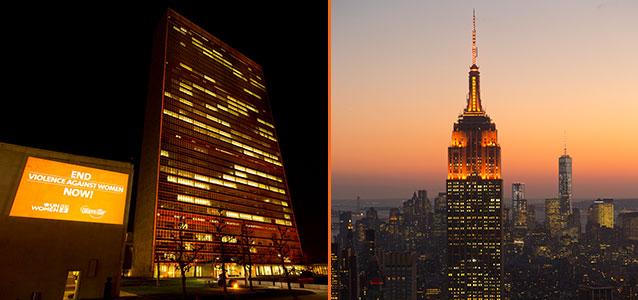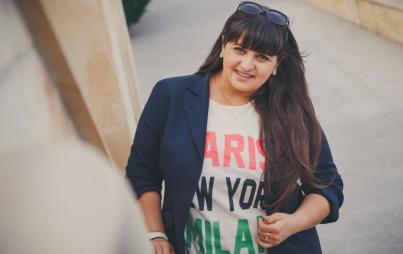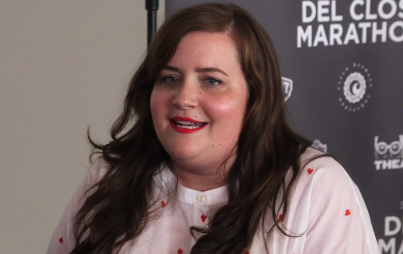
So we’re over the Thanksgiving hump, possibly still nibbling on leftover stuffing, likely still on a days-long sugar crash. For many, this officially means ‘tis the season to be jolly. But before we dive into some off-key caroling, let’s throw ourselves into an all-too-often overlooked—and far more crucial—other season.
Cast off your green and red trappings and don us now some orange apparel: We’re officially in the midst of the 16 Days of Activism Against Gender-Based Violence. The 16 Days Campaign, marked by a distinct orange hue—hence the Empire State Building’s current flame-colored glow—is, according to the UN, “a time to galvanize action to end violence against women and girls around the world.”
The 16 days are kicked off every year on November 25, the International Day Against Violence Against Women. Established by official UN resolution in December of 1999, the date was chosen to honor the legacy of the three Mirabel sisters of the Dominican Republic. The sisters—feminist icons and activists who were renowned throughout Latin American in the mid 1950s—were murdered by Dominican dictator Rafael Trujillo on November 25. Fifty-three years later, the day of their brutal slaying was selected as the beginning of a globally recognized movement.
The 16 days of activism conclude on December 10, International Human Rights Day, a date specifically selected to draw a firm connection between the notion of women’s rights and human rights.
And god are we lacking in them.
Violence against women is a global pandemic. Among women between the ages of 15 and 44, acts of violence cause more deaths and disability than cancer, malaria, traffic accidents and war—combined. An estimate from the World Health Organization reveals that 35% of women worldwide will experience some form of gender-based violence throughout the course of their lives—though national surveys reveal that this figure is as high as 70% in some countries.
603 million women, in fact, live in countries where domestic violence isn’t even a crime.
Not to suggest, of course, that the United States is immune from this global pandemic—or that it gets the serious consideration it warrants. Ray Rice is back on the NFL market in a country where one in four women suffers domestic violence in her lifetime—and, in one study, one in five men admitted to perpetrating domestic violence.
And then there's our nation's sexual violence epidemic. This is a country in which one out of four women are the victims of rapes or attempted rapes in their lifetimes—some even referred to as "it" while being violently gang-raped at fraternities. Bill Cosby only recently began garnering widespread criticism and attention for his string of serial rapes that stem back decades—and still has a swath of defenders.
For as much as we point to other countries and pat ourselves on the back for being "ahead," we are a culture where violence against women is normalized.
Given the staggering depth and breadth of the issue, we’re devoting a special series to these crucial 16 days of activism, examining multiple aspects of this horrifying pandemic that affects both us at home and women abroad.
In the words of Amnesty International:
“Violence against women and girls destabilizes countries, impedes economic progress, and prevents women from raising healthy children, contributing to the household and their community, and creating better lives for themselves and their families.”
But with knowledge and awareness comes transformation; nothing will change unless we can look at this hideous, destructive, global culture of violence in the eye and accept the magnitude of the issue.
So throw jolly out the window. It’s time for a season of critical interrogation of the violence that plagues our global community—and it’s always time to act toward dismantling it.



![[My son] is not gross. [My son] is not gross.](/sites/default/files/styles/profile/public/images/article/2019-05/image1%2520%25289%2529.JPG?itok=WmvvKF9O)


